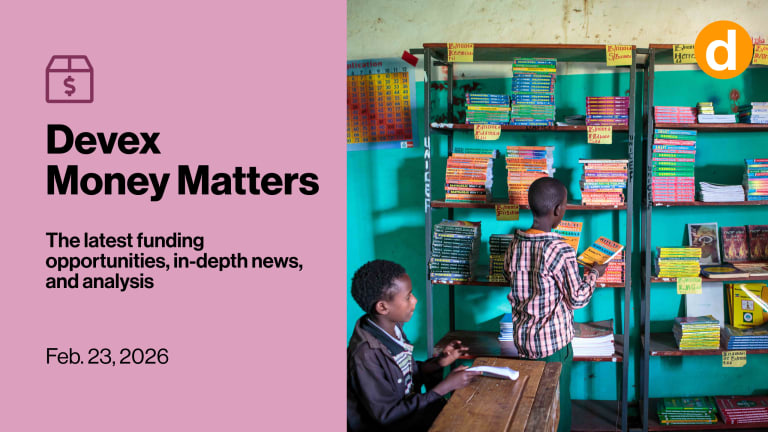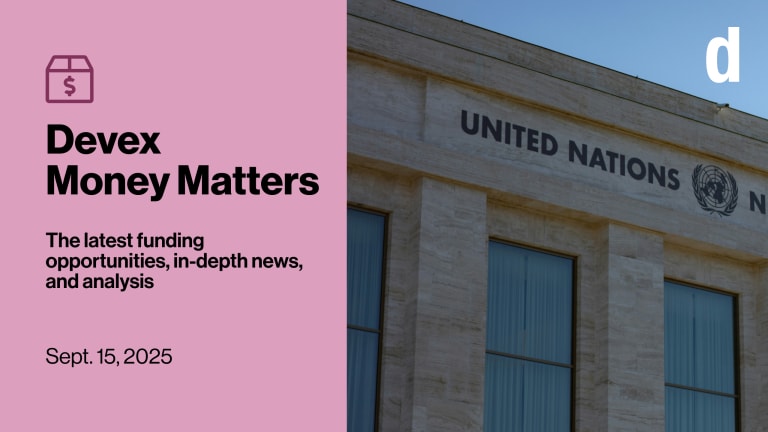
In news that is — at this point — a surprise to no one, the United States is making more moves to pull money away from its foreign aid budget, with a $9.4 billion rescission package passing in the Republican-led House of Representatives last week.
The package includes a clawback of $8.3 billion in already-approved foreign aid, and though it still needs to be cleared by the U.S. Senate, it’s another step toward the country’s continuous dissolution of international assistance.
Also in this edition: The future of cash aid, cuts to UNFPA, and the AIIB’s 10th birthday
+ Are there topics you want to read more about in Money Matters? We want your feedback.
Going, going … gone?
The House of Representatives has approved the Trump administration’s first rescission package, clearing the way for $8.3 billion in foreign assistance — which was already approved by Congress — to be canceled.
The move is the first of several rescission packages expected to fulfill Trump’s 2026 budget request, in which the president asked Congress to reduce money for aid to around $30 billion in both fiscal years 2025 and 2026.
The vast majority of the cuts are for 2025 — money approved after the Department of Government Efficiency, Elon Musk’s budget-slashing agency, canceled 85% of USAID programs.
That means the package won’t just codify cuts that DOGE made earlier this year, but rescind billions more dollars in foreign aid, Emily Byers, Save the Children’s managing director of global development policy, told me last week.
“That money is not programmed, not obligated, not funding any Biden-era anything,” said Byers, who noted the administration could use that money to fund its own priorities. “The administration has said, and Secretary Rubio has said, that foreign assistance is still something that we’re going to do. So it just doesn’t make a whole lot of sense to us.”
It’s not a done deal; the package will make its way to the Senate. But if it passes in both chambers, the U.S. would move to pull $900 million from global health spending alone, on top of billions of dollars for development assistance, disaster relief, and support for United Nations agencies.
“President @realDonaldTrump and House Republicans campaigned on reining in reckless spending and cutting waste, fraud, and abuse,” Rep. Elise Stefanik, a Republican from New York and at one point, Trump’s pick for the country’s U.N. ambassador, posted on the social media platform X. “Promises made, promises kept.”
Read: House approves Trump’s $8.3 billion clawback of US foreign aid
+ Speaking of cuts to global health programs, on June 20, Friday, we’ve got a live event on the future of PEPFAR and global HIV relief. Save your spot now. It’s part of a packed schedule that also includes an exclusive interview with Leslie Maasdorp of British International Investment on June 18, Wednesday, ahead of the 4th International Conference on Financing for Development later this month.
Funding activity
We publish tenders, grants, and other funding announcements on our funding platform. Here are some of those viewed the most in the past 10 days.
The African Union Commission has provided $50,000 to support practical education innovations aimed at addressing education and skills development challenges in Africa.
The Council of Europe Development Bank has signed a €250 million loan agreement to support strategic investments in MSMEs, municipal infrastructure, and social and affordable housing in Croatia.
The Inter-American Development Bank has provided $37.2 million in funding to develop infrastructure projects in Guatemala.
The Netherlands Organisation for International Cooperation in Higher Education awarded a grant of €75,000 to support knowledge development across the green hydrogen value chain in Morocco.
UNOPS has issued a call for proposals to enhance the quality and efficiency of healthcare delivery across multiple hospitals in Sri Lanka.
The World Bank has announced a $2 billion investment to boost job creation and economic development in Peru.
+ Try out Devex Pro Funding today with a free five-day trial, and explore funding opportunities from over 850 sources in addition to our analysis and news content.
The crumbling call for cash
Once hailed as one of the most effective, dignified, and efficient forms of foreign aid, cash and voucher assistance — like so much in the development world — is now under threat.
For years, the U.S. was the largest supporter of cash aid, accounting for nearly half of all global contributions, my colleague Ayenat Mersie writes. But now, new data from the CALP Network shows the share of humanitarian assistance delivered as cash has fallen from 24% in 2022 to just 20% in 2024. The Trump administration’s retreat from foreign assistance includes moves to cancel cash-based awards, so that drop-off may accelerate even further in the months to come.
“This is the moment for donors to fund the use of cash, not incrementally, but ambitiously,” said Tom Fletcher, U.N. under-secretary-general for humanitarian affairs, in a recent video on X.
Read: Amid aid cuts, the future of cash programming hangs in the balance
A game of pingpong, with devastating consequences
In Madagascar’s capital, a small UNFPA-supported clinic provides a lifeline for pregnant teens. There’s Finoana, a 16-year-old whose partner denies that he’s responsible for her pregnancy. Tina, who’s the same age, has a boyfriend who sells food for a living. And the dozens of other women — some as young as 13 — who receive free contraceptives, childbirth delivery, prenatal and postnatal care, and more.
But across the globe, clinics like these are at risk of shuttering as U.S. funding for the U.N. Population Fund dries up. The Trump administration has terminated $335 million in grants to the agency — cutting support for maternal health, contraceptives, and gender-based violence services in some of the world’s most fragile settings. The rescission package that just passed the House of Representatives would slash that money even further, while Trump’s 2026 budget request eliminates funding for family planning entirely.
In Madagascar alone, that means nearly half a million people could lose access to reproductive health care.
“For this particular U.N. agency, U.S. funding is like a game of pingpong — every Republican president since Ronald Reagan has stopped funding to the agency, while Democratic presidents have restored it,” writes my colleague Sara Jerving, who visited the clinic earlier this year. “But this time was different.”
Read: UNFPA and the human fallout of US aid cuts: A $335 million gap
+ For more content like this, sign up to Devex CheckUp, a free weekly newsletter that provides front-line and behind-the-scenes reporting on global health.
Zooming out
Following on from the G7 Leaders’ Summit, which took place yesterday, Oxfam International has carried out an analysis tracking whether the group’s spending on development is going up or down.
Down, it seems. Spending is expected to fall 28% in 2026, compared to 2024 — a drop of around $44 billion across the world.
On top of that, 2026 will mark the third year in a row of declining G7 aid, the analysis finds. Those decreases are driven primarily by the U.S., which is projected to slash its aid by $33 billion in 2026. The United Kingdom’s aid is also expected to drop by $5 billion, while Germany’s will decrease by $3.5 billion, and France’s will be cut by $3 billion.
Happy birthday, AIIB!
All that being said, there are other places where money continues to flow — including at the Asian Infrastructure Investment Bank, a multilateral development bank based in Beijing.
The AIIB will hold its annual meeting later this month, marking one decade since its founding in 2016. In the years between then and now, the bank has approved 319 projects worth nearly $61 billion, guided by priorities including green infrastructure, regional connectivity, and private capital mobilization.
A Devex analysis of AIIB’s project portal shows annual approvals fluctuated in recent years — peaking at $11.4 billion in 2023 before dipping to $8.1 billion in 2024. India remains the bank’s top borrower, receiving $6.2 billion since 2021. And transport leads sectorally, followed by multisector and energy projects.
Looking ahead, AIIB has 56 proposed projects in its pipeline, totaling $14.6 billion — with Indonesia’s $1.2 billion Trans-Sumatra Toll Road topping the list.
Read: AIIB's 10th anniversary — where is the money going? (Pro)
+ Not yet a Devex Pro member? Start your 15-day free trial today to access all our expert analyses, insider insights, funding data, events, and more. Check out all the exclusive content available to you.
Search for articles
Most Read
- 1
- 2
- 3
- 4
- 5








